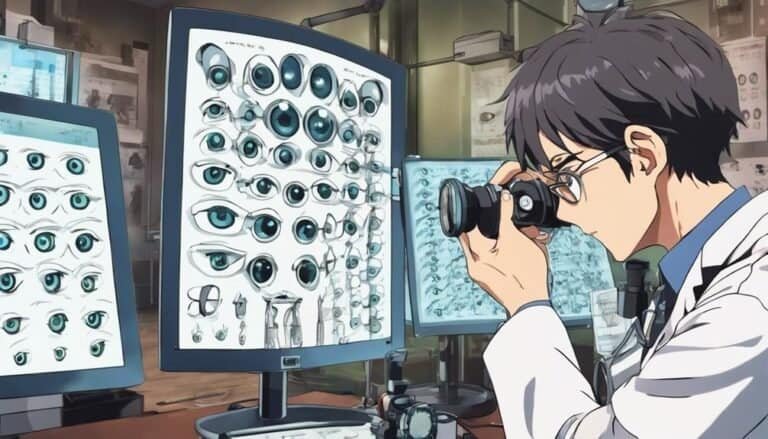Job Duties for Medical Scientist
The role of a medical scientist encompasses a wide array of responsibilities that are vital in advancing the field of healthcare. From conducting intricate research studies to analyzing complex data, their work is underpinned by a commitment to innovation and discovery.
However, the scope of their duties extends far beyond the laboratory, involving the development of groundbreaking treatments and the presentation of significant findings. Yet, there is one aspect of their work that often remains shrouded in mystery, hinting at the intricate process of securing funding for projects that could shape the future of medicine.
Key Takeaways
- Conducting meticulous research studies with ethical standards and statistical analysis.
- Developing new treatments through effective clinical trial design and drug development processes.
- Mastering research proposal writing for securing funding and aligning with funders' criteria.
- Presenting research findings clearly, selecting reputable outlets, and following authorship guidelines for dissemination.
Conducting Research Studies
Conducting research studies is a fundamental responsibility for medical scientists, essential for advancing knowledge in the field of healthcare and medicine. Research methodology and study design are vital aspects of this process. Medical scientists meticulously plan and execute studies, ensuring that the chosen methodology aligns with the research objectives. They design studies that adhere to ethical standards and produce reliable results.
Once the data is collected, medical scientists engage in data interpretation and statistical analysis to derive meaningful conclusions. This step involves organizing and analyzing the data using statistical tools to identify patterns, trends, and correlations. Statistical analysis allows medical scientists to determine the significance of their findings and draw valid conclusions based on the evidence gathered. It is imperative that medical scientists possess strong analytical skills to interpret data accurately and communicate their findings effectively to the scientific community.
Analyzing Experimental Data
Upon completion of data collection in research studies, medical scientists meticulously analyze experimental data to extract valuable insights and draw evidence-based conclusions. Data interpretation techniques and statistical analysis methods play a pivotal role in this phase.
Medical scientists utilize various statistical tools such as regression analysis, t-tests, and ANOVA to identify patterns, relationships, and significance within the data. They employ data visualization techniques to present their findings effectively, using tools like graphs, charts, and tables to illustrate trends and correlations.
Clear data presentation strategies are essential for conveying complex information in a comprehensible manner to colleagues, stakeholders, and the broader scientific community. By employing these methods, medical scientists can interpret experimental data accurately, derive meaningful conclusions, and contribute to the advancement of medical knowledge and healthcare practices.
This analytical approach guarantees that research outcomes are robust, reliable, and impactful in shaping future investigations and potential treatments.
Developing New Treatments
The process of developing new treatments as a medical scientist involves employing various treatment research methods to explore potential therapeutic interventions.
Designing effective clinical trials is vital in evaluating the safety and efficacy of these treatments in controlled settings.
Additionally, understanding the drug development process, from initial discovery to final approval, is essential for medical scientists to contribute meaningfully to the field of healthcare innovation.
Treatment Research Methods
In the domain of medical science, the exploration of innovative treatment research methods is fundamental to advancing patient care and addressing unmet medical needs. When conducting studies to assess treatment efficacy, medical scientists engage in a variety of research methods.
Some key approaches include:
- Clinical Trials: Designing and overseeing clinical trials to evaluate the effectiveness and safety of new treatments.
- Experimental Design: Developing robust experimental designs to guarantee the validity and reliability of research outcomes.
- Data Analysis: Utilizing advanced statistical methods to analyze and interpret data collected during treatment research studies.
These methods play an important role in shaping the future of healthcare by providing evidence-based insights into the development of new treatments.
Clinical Trial Design
Effective development of new treatments in the medical field heavily relies on meticulously structured clinical trial designs aimed at evaluating treatment efficacy and safety. Clinical trial ethics play a vital role in safeguarding patient rights and ensuring the integrity of the research process. Patient recruitment strategies are carefully planned to enroll participants meeting specific criteria. Data management is meticulously executed to accurately collect and analyze trial data. Statistical analysis is then applied to interpret the results and draw meaningful conclusions. A well-designed clinical trial is essential for generating reliable evidence to support the effectiveness and safety of new treatments.
| Clinical Trial Design | Description |
|---|---|
| Clinical Trial Ethics | Safeguarding patient rights and research integrity |
| Patient Recruitment | Strategic methods to enroll eligible participants |
| Data Management | Accurate collection and analysis of trial data |
Drug Development Process
Developing new treatments in the medical field involves a complex and rigorous drug development process that encompasses various stages from initial research to final approval. This process is important in ensuring that new drugs are safe and effective for patient use.
Key aspects of the drug development process include:
- Research and Development: Scientists conduct initial research to identify potential drug candidates.
- Clinical Trials: Drugs undergo rigorous testing in clinical trials to evaluate their efficacy and safety profiles.
- Regulatory Approval: After successful clinical trials, drugs must receive regulatory approval before they can be marketed and prescribed to patients.
This process is essential for bringing innovative treatments to those in need while upholding strict standards of safety and effectiveness.
Writing Research Proposals
When crafting research proposals, medical scientists must master the art of structuring proposals effectively while carefully selecting suitable funding sources. Understanding proposal structure tips can greatly enhance the chances of securing research grants, making it important for scientists to hone this skill.
Additionally, selecting the right funding sources is essential for aligning research goals with the priorities and criteria of potential funders.
Proposal Structure Tips
Ensuring a well-structured proposal is essential for conveying a research project's significance and methodology effectively. When crafting a research proposal, consider the following tips:
- Clear Objectives: Clearly outline the research objectives and how they align with the grant requirements to demonstrate the project's importance.
- Detailed Methodology: Provide a detailed plan of the research methods and techniques to be employed, showcasing a thorough understanding of the project's implementation.
- Realistic Budget: Develop a realistic budget that reflects the project's needs and aligns with the funding opportunities available, ensuring all costs are accounted for efficiently.
Funding Source Selection
Selecting an appropriate funding source is a critical aspect of the research proposal writing process, as it directly impacts the feasibility and success of the project. When contemplating budget planning and grant applications, medical scientists must evaluate various funding options to secure financial support for their research endeavors. Effective financial management is essential to make certain that research funding is utilized efficiently and transparently. Below is a table highlighting key points to think about in funding source selection:
| Funding Source | Description | Application Deadline | Maximum Grant Amount |
|---|---|---|---|
| National Institutes of Health (NIH) | Major funding source for biomedical research | Varies | Varies |
| National Science Foundation (NSF) | Supports research across all scientific disciplines | Bi-annual | $1.5M |
| Pharmaceutical Companies | Industry-sponsored research funding | Rolling | $500K |
Presenting Research Findings
Effectively communicating research findings is an essential skill for medical scientists, as it allows for the dissemination of valuable information to peers and the broader scientific community. When presenting research findings, medical scientists need to excel in data interpretation, presentation skills, peer review, and scientific communication.
Here are three key aspects to ponder:
- Clarity and Precision: Presenting research findings in a clear and precise manner is vital to ascertain that the audience comprehends the implications of the study. Medical scientists should use appropriate visual aids, such as graphs and tables, to enhance the clarity of the data presented.
- Engaging with Peer Review: Engaging with the peer review process is fundamental in validating research findings. Medical scientists should be open to feedback, address any concerns raised by reviewers, and make necessary revisions to enhance the quality and reliability of their work.
- Scientific Communication: Effective scientific communication involves disseminating research findings through conferences, publications, and collaborations. Medical scientists should be adept at articulating their work to different audiences, including fellow researchers, healthcare professionals, and policymakers, to maximize the impact of their research.
Collaborating With Healthcare Professionals
Collaborating with healthcare professionals as a medical scientist involves working in interdisciplinary teams to conduct research that supports patient care. This collaboration allows for the integration of scientific findings into clinical practice, ultimately enhancing patient outcomes.
Teamwork in Research
When conducting research in the medical field, working closely with healthcare professionals is essential for gathering valuable insights and advancing scientific knowledge. Effective teamwork in research involves various collaboration dynamics and team communication strategies.
Key components include:
- Clear Roles and Responsibilities: Establishing roles within the research team guarantees that each member knows their responsibilities, promoting efficiency and accountability.
- Regular Meetings and Updates: Scheduled meetings facilitate research project coordination, allowing team members to discuss progress, challenges, and next steps.
- Respect for Diverse Perspectives: Embracing different viewpoints enhances group dynamics, fostering innovation and thorough problem-solving approaches.
Support Patient Care
To enhance patient care outcomes, seamless collaboration with healthcare professionals is important for medical scientists. By actively engaging in patient advocacy and providing healthcare support, medical scientists play a crucial role in ensuring thorough care coordination and effective treatment planning. Through close collaboration with physicians, nurses, and other healthcare team members, medical scientists contribute valuable insights that aid in diagnosing conditions, determining the best treatment strategies, and monitoring patient progress. This collaborative approach helps in improving patient outcomes and overall healthcare quality. Effective communication and mutual respect among healthcare professionals are essential for creating a cohesive care environment that prioritizes patient well-being.
| Key Points | Description | Importance |
|---|---|---|
| Patient Advocacy | Advocating for patients' needs and ensuring they receive proper care | Ensures patients receive the best possible treatment and support |
| Healthcare Support | Providing assistance to healthcare professionals in delivering patient care | Enhances the efficiency and effectiveness of healthcare delivery |
| Care Coordination | Coordinating various aspects of patient care to ensure seamless treatment | Reduces errors, improves communication, and enhances outcomes |
Designing Scientific Experiments
Designing scientific experiments involves meticulously planning and structuring research protocols to investigate specific hypotheses in the field of medical science. To ensure the validity and reliability of the findings, medical scientists utilize various experimental design strategies and statistical analysis techniques.
These methodologies help in controlling variables, establishing causal relationships, and minimizing bias in the research process. Additionally, understanding research methodology is important for designing experiments that adhere to ethical standards and regulatory guidelines.
Data interpretation techniques play an important role in extracting meaningful insights from the results obtained through experiments, enabling medical scientists to draw accurate conclusions and make informed decisions based on evidence. By incorporating these elements into the experimental design process, medical scientists can contribute significantly to advancing knowledge in the field of medical science and ultimately improving patient care outcomes.
Testing Hypotheses
In the domain of medical science, testing hypotheses is a fundamental process that rigorously evaluates the validity of proposed theories through systematic experimentation and analysis. Experimental design plays a critical role in this phase, as it outlines the procedures and methods for conducting tests to answer specific research questions. Medical scientists carefully craft hypotheses that are clear, testable, and based on existing knowledge to guarantee the validity of their experimental outcomes.
Hypothesis testing involves gathering relevant data through experiments, observations, or clinical trials. The collected data is then subjected to rigorous analysis using statistical tools and methodologies to determine the significance of the results. Data analysis is a meticulous process that requires attention to detail and the ability to draw meaningful conclusions from the information gathered.
Result interpretation is the final step in testing hypotheses, where medical scientists evaluate the outcomes of their experiments in relation to the initial hypotheses. This stage involves critical thinking and a deep understanding of the subject matter to draw accurate conclusions and contribute valuable insights to the field of medical science.
Publishing Research Results
Upon successfully testing hypotheses in the domain of medical science, the imperative next step is the dissemination of research findings through the publication of research results. This step allows for the sharing of new knowledge with the scientific community, advancing the field and contributing to the body of literature.
To effectively publish research results, medical scientists must consider the following key aspects:
- Research publication trends, Impact factor analysis: Understanding current trends in research publication, such as open access journals or preprint servers, is vital for reaching a wider audience. Additionally, analyzing the impact factor of potential journals helps in selecting reputable outlets for dissemination.
- Authorship guidelines, Citation analysis: Adhering to authorship guidelines ensures proper credit is given to all contributors, maintaining ethical standards in research. Conducting citation analysis helps in tracking the influence and reach of published work within the scientific community.
- Peer review process, Publication ethics: Engaging in the peer review process guarantees the quality and validity of research findings before publication. Adhering to publication ethics, such as avoiding plagiarism and disclosing conflicts of interest, upholds the integrity of scientific research.
Securing Funding for Projects
To effectively conduct research projects in the field of medical science, securing funding is a critical aspect that requires strategic planning and resource allocation. Medical scientists often rely on securing funding through various avenues such as grant applications, which involve detailed proposals outlining the research project, its significance, and the budget planning required to execute it.
In addition to traditional grant funding, medical scientists may also engage in investor pitches where they present their research projects to potential investors. These pitches typically include financial projections demonstrating the expected outcomes of the research and the potential return on investment for the funding provided.
Successful funding acquisition is essential for the advancement of medical science research, as it enables scientists to acquire the necessary resources, equipment, and personnel to carry out their investigations effectively. Mastering the art of grant applications, budget planning, investor pitches, and financial projections is crucial for medical scientists looking to secure funding for their projects and drive innovation in the field.
Conclusion
To sum up, the job duties for medical scientists entail:
- Conducting research studies
- Analyzing experimental data
- Developing new treatments
- Writing research proposals
- Presenting research findings
- Designing scientific experiments
- Testing hypotheses
- Publishing research results
- Securing funding for projects
This role requires a meticulous approach to research and a dedication to advancing medical knowledge. While the workload may seem overwhelming, the opportunity to contribute to groundbreaking discoveries in the field of medicine makes it all worthwhile.







